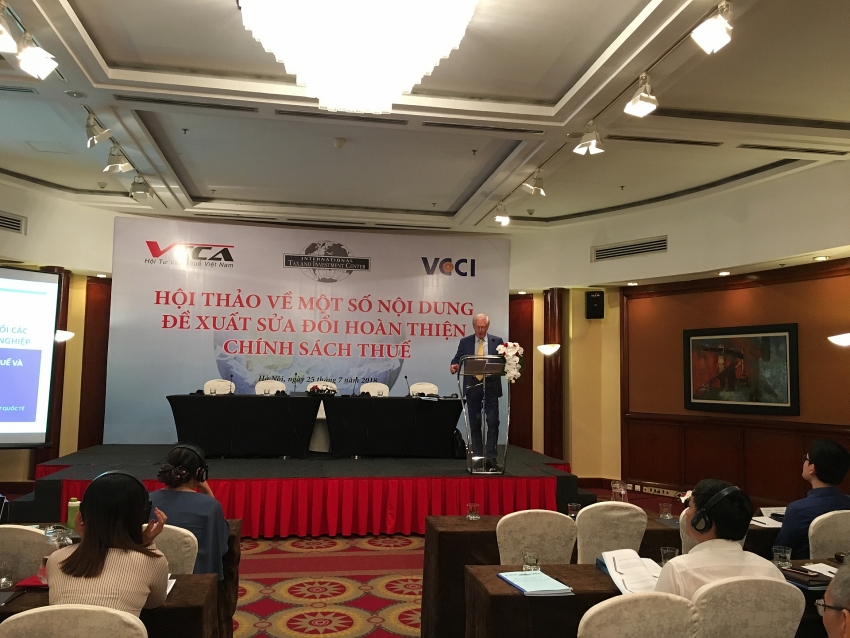Multi-dimensional opinions during formation of law on tax
 |
| Wayne Barford's representation about of laws |
This was the opinion of experts as well as representatives of the relevant authorities at a workshop on the orientation for amending and improving a number of articles of Law on Tax organised by the Vietnam Tax Consultants' Association (VTCA) and Vietnam Chamber of Commerce and Industry (VCCI) on July 25.
The workshop was organised to create a forum for exchanging opinions among agencies in charge of developing law projects, enterprises and international and local experts with experience in this field.
Nguyen Thi Cuc, chairwoman of VTCA, said, "First of all, forming laws is a very important issue and in order to build a good and feasible legal document, it is important to collect the opinions of economic experts, associations and even drafting agencies. The opinions expressed through the workshops will contribute to the drafting committee's selection of ideas to be adopted.
At the workshop, numerous opinions were raised by experts, including the opinion of Wayne Barford, senior advisor of the International Tax and Investment Centre.
According to Wayne Barford, in order to maintain the above principles, countries should avoid sudden increases in taxes and maintain tax rates that match affordability and create tax payers.
When asked about the international practice of imposing taxes, Barford responded, "I have reviewed the special consumption tax on soft drinks in a number of countries. There are no countries in the world that have reduced their rate of obesity and overweightness due to this tax. I can assure that there is no international best practice yet implemented on this tax. There are many countries that have not considered this tax or did consider it and decided against it because it has negative impacts on their countries. There are also countries that have introduced this tax and repealed it a couple of years later because it caused complexities and did not achieve the desired outcome that was expected.”
“In reality, international practice shows that a good educational programme is far more effective than a tax. Singapore and Japan have promoted education and knowledge dissemination and use market based policy instruments such as providing guidelines and ingredient labeling,” he concluded.
What the stars mean:
★ Poor ★ ★ Promising ★★★ Good ★★★★ Very good ★★★★★ Exceptional
Related Contents
Latest News
More News
- Citi sharpens its focus on institutional banking (February 09, 2026 | 19:58)
- SSC steps up engagement with FTSE Russell on market reforms (February 09, 2026 | 17:33)
- IFC considers $50m trade finance guarantee facility for Nam A Bank (February 09, 2026 | 17:28)
- Hoa Phat Agricultural Development debuts shares on HSX (February 06, 2026 | 14:00)
- Vietcap’s VAD 2026 draws strong global investor turnout (February 06, 2026 | 13:30)
- New rules ease foreign access to Vietnam equities (February 05, 2026 | 17:29)
- 0.1 per cent tax proposed on each transfer of digital assets (February 05, 2026 | 17:27)
- Ministry of Finance tightens policy delivery at start of year (February 05, 2026 | 17:26)
- Vietnam steps up market reforms as FTSE Russell reviews upgrade progress (February 05, 2026 | 17:20)
- 2025 profits mixed amid strong energy and farming results (February 05, 2026 | 17:18)

 Tag:
Tag:

























 Mobile Version
Mobile Version